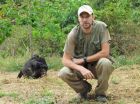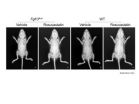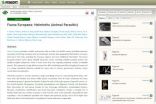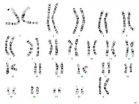(Press-News.org) (Chicago) -- Of all of the world's species, humans and chimpanzees are some of the only to engage in coordinated attacks on other members of their same species. Jane Goodall was among the first to introduce the occurrence of lethal inter-community killings and since then primatologists and anthropologists have long debated the concept of warfare in this genus. Research theories have pointed to increased gains and benefits of killing off competitors and opening up increased access to key resources such as food or mates. In contrast, others have argued that warfare is a result of human impact on chimpanzees, such as habitat destruction or food provisioning, rather than adaptive strategies.
New research from an international coalition of ape researchers, published September 18 in the journal Nature, has shed new light on the subject, suggesting that human encroachment and interference is not, as previous researchers have claimed, an influential predictor of chimp-on-chimp aggression.
The study began as a response to a growing number of commentators claiming that chimpanzee violence was caused by human impacts. "This is an important question to get right. If we are using chimpanzees as a model for understanding human violence, we need to know what really causes chimpanzees to be violent," said University of Minnesota researcher Michael L. Wilson, lead author on the study.
"Humans have long impacted African tropical forests and chimpanzees, and one of the long-standing questions is if human disturbance is an underlying factor causing the lethal aggression observed," explained co-author David Morgan, PhD, research fellow with the Lester E Fisher Center for the Study and Conservation of Apes at Lincoln Park Zoo in Chicago. Morgan has studied chimpanzees deep in the forests of Republic of Congo for 14 years. "A key take-away from this research is that human influence does not spur increased aggression within or between chimpanzee communities."
A team of 30 ape researchers assembled extensive data sets spanning five decades of research gathered from 18 chimpanzee communities experiencing varying degrees of human influence. In all, data included pattern analysis of 152 killings by chimpanzees. The key findings indicate that a majority of violent attackers and victims of attack are male chimpanzees, and the information is consistent with the theory that these acts of violence are driven by adaptive fitness benefits rather than human impacts.
"Wild chimpanzee communities are often divided into two broad categories depending on whether they exist in pristine or human disturbed environments," explained Morgan. "In reality, however, human disturbance can occur along a continuum and study sites included in this investigation spanned the spectrum. We found human impact did not predict the rate of killing among communities.
"The more we learn about chimpanzee aggression and factors that trigger lethal attacks among chimpanzees, the more prepared park managers and government officials will be in addressing and mitigating risks to populations particularly with changing land use by humans in chimpanzee habitat," explained Morgan.
INFORMATION:
The international consortium comprises researchers from Duke University, Harvard University, Iowa State University, Jane Goodall Institute, Kyoto University, Lincoln Park Zoo, Makerere University, Max Planck Institute for Evolutionary Anthropology, University of Cambridge, University of Michigan, University of Minnesota, University of New Mexico, University of Oregon, University of St Andrews, Washington University in St Louis, Wildlife Research Center and Yale University.
Lincoln Park Zoo
Media Contacts:
Sharon Dewar
(312) 742-2246
SDewar@lpzoo.org
Jillian Braun
(312) 742-5791
JBraun@lpzoo.org
ABOUT LINCOLN PARK ZOO
Lincoln Park Zoo, a historic Chicago landmark founded in 1868, is dedicated to connecting people with nature by providing a free, family-oriented wildlife experience. A leader in conservation science both globally and locally, the zoo exemplifies the highest quality animal care and educational outreach. The not-for-profit zoo, managed by The Lincoln Park Zoological Society, is a member-supported organization and one of the nation's only free, privately managed zoos. For more information, call 312 -742-2000 or visit http://www.lpzoo.org.
Nature of war: Chimpanzees inherently violent according to study
New research disproves theory that 'chimpanzee wars' are sparked by human influence
2014-09-17
ELSE PRESS RELEASES FROM THIS DATE:
Modern Europeans descended from three groups of ancestors
2014-09-17
New studies of ancient DNA are shifting scientists' ideas of how groups of people migrated across the globe and interacted with one another thousands of years ago. By comparing nine ancient genomes to those of modern humans, Howard Hughes Medical Institute (HHMI) scientists have shown that previously unrecognized groups contributed to the genetic mix now present in most modern-day Europeans.
"There are at least three major, highly differentiated populations that have contributed substantial amounts of ancestry to almost everybody that has European ancestry today," says ...
Chimpanzee lethal aggression a result of adaptation rather than human impacts
2014-09-17
In the 1970s, Jane Goodall's reports of chimpanzee violence caught the attention of a global audience. Since then, many people have compared chimpanzee intergroup aggression to primitive warfare and have argued that chimpanzee violence is an adaptive strategy that gives the perpetrators an edge. Others have argued that lethal aggression is the consequence of human activities such as provisioning (artificial feeding) by researchers or habitat destruction. A new study of the pattern of intergroup aggression in chimpanzees and their close relatives, bonobos (also called pygmy ...
Researchers use iPS cells to show statin effects on diseased bone
2014-09-17
Skeletal dysplasia is a group of rare diseases that afflict skeletal growth through abnormalities in bone and cartilage. Its onset hits at the fetal stage and is caused by genetic mutations. A mutation in the gene encoding fibroblast growth factor receptor 3 (FGFR3) has been associated with two types of skeletal dysplasia, thanatophoric dysplasia (TD), a skeletal dysplasia that cause serious respiratory problems at birth and is often lethal, and achondroplasia (ACH), which causes stunted growth and other complications throughout life. Several experimental treatments have ...
Math model designed to replace invasive kidney biopsy for lupus patients
2014-09-17
COLUMBUS, Ohio – Mathematics might be able to reduce the need for invasive biopsies in patients suffering kidney damage related to the autoimmune disease lupus.
In a new study, researchers developed a math model that can predict the progression from nephritis – kidney inflammation – to interstitial fibrosis, scarring in the kidney that current treatments cannot reverse. A kidney biopsy is the only existing way to reach a definitive diagnosis of the damage and its extent.
The model could also be used to monitor the effectiveness of experimental treatments for inflammation ...
Large study reveals new genetic variants that raise risk for prostate cancer
2014-09-17
In an analysis of genetic information among more than 87,000 men, a global team of scientists says it has found 23 new genetic variants – common differences in the genetic code -- that increase a man's risk for prostate cancer. The so-called "meta-analysis," believed to be the largest of its kind, has revealed once hidden mutations among men in a broad array of ethnic groups comprising men of European, African, Japanese and Latino ancestry.
The meta-analysis combined information from smaller studies, according to William B. Isaacs, Ph.D., a genetic scientist at the Brady ...
Babies learn words differently as they age, researcher finds
2014-09-17
COLUMBIA, Mo. – Research has shown that most 18-month-olds learn an average of two to five new words a day; however, little is known about how children process information to learn new words as they move through the preschool years. In a new study, a University of Missouri researcher has found that toddlers learn words differently as they age, and a limit exists as to how many words they can learn each day. These findings could help parents enhance their children's vocabularies and assist speech-language professionals in developing and refining interventions to help children ...
Contributions on Fauna Europaea: Data papers as innovative model on expert involvement
2014-09-17
Fauna Europaea started in 2000 as an EC-FP5 four-year project, delivering its first release in 2004. After 14 years of steady progress and successful participations in several EC projects, as a part of the EC-FP7 European Biodiversity Observation Network project (EU BON), to increase the general awareness of the work done by the contributors and to extend the general dissemination of the Fauna Europaea results, the Biodiversity Data Journal has applied its novel e-Publishing tools to prepare data papers for all 56 major taxonomic groups.
Fauna Europaea provides a public ...
Big surprises can come in small packages
2014-09-17
Astronomers using the NASA/ESA Hubble Space Telescope have found a monster lurking in a very unlikely place. New observations of the ultracompact dwarf galaxy M60-UCD1 have revealed a supermassive black hole at its heart, making this tiny galaxy the smallest ever found to host a supermassive black hole. This suggests that there may be many more supermassive black holes that we have missed, and tells us more about the formation of these incredibly dense galaxies. The results will be published in the journal Nature on 18 September 2014.
Lying about 50 million light-years ...
A link between Jacobsen syndrome and autism
2014-09-17
SAN DIEGO, Calif. (Sept. 17, 2014)— A rare genetic disorder known as Jacobsen syndrome has been linked with autism, according to a recent joint investigation by researchers at San Diego State University and the University of California, San Diego. In addition to suggesting better treatment options for people with Jacobsen syndrome, the finding also offers more clues into the genetic underpinnings of autism.
Jacobsen syndrome affects approximately 1 in 100,000 people, according to the National Institutes of Health. It occurs in a person when there is a deletion at the end ...
Lack of facial expression leads to perceptions of unhappiness, new OSU research shows
2014-09-17
CORVALLIS, Ore. – People with facial paralysis are perceived as being less happy simply because they can't communicate in the universal language of facial expression, a new study from an Oregon State University psychology professor shows.
The findings highlight the important role the face plays in everyday communication and indicates people may hold a prejudice against those with facial paralysis because of their disability, said Kathleen Bogart, an assistant professor of psychology in the College of Liberal Arts at Oregon State University.
"People are more wary and ...
LAST 30 PRESS RELEASES:
Findings of large-scale study on 572 Asian families supports gene-directed management of BRCA1 and BRCA2 gene carriers in Singapore
Many children with symptoms of brain injuries and concussions are missing out on vital checks, national US study finds
Genetic hope in fight against devastating wheat disease
Mutualism, from biology to organic chemistry?
POSTECH Professor Yong-Young Noh resolves two decades of oxide semiconductor challenges, which Is published in prestigious journal Nature
Could fishponds help with Hawaiʻi’s food sustainability?
International network in Asia and Europe to uncover the mysteries of marine life
Anthropologist documents how women and shepherds historically reduced wildfire risk in Central Italy
Living at higher altitudes in India linked to increased risk of childhood stunting
Scientists discover a new signaling pathway and design a novel drug for liver fibrosis
High-precision blood glucose level prediction achieved by few-molecule reservoir computing
The importance of communicating to the public during a pandemic, and the personal risk it can lead to
Improving health communication to save lives during epidemics
Antimicrobial-resistant hospital infections remain at least 12% above pre-pandemic levels, major US study finds
German study finds antibiotic use in patients hospitalised with COVID-19 appears to have no beneficial effect on clinical outcomes
Targeting specific protein regions offers a new treatment approach in medulloblastoma
$2.7 million grant to explore hypoxia’s impact on blood stem cells
Cardiovascular societies propel plans forward for a new American Board of Cardiovascular Medicine
Hebrew SeniorLife selected for nationwide collaborative to accelerate system-wide spread of age-friendly care for older adults
New tool helps identify babies at high-risk for RSV
Reno/Sparks selected to be part of Urban Heat Mapping Campaign
Advance in the treatment of acute heart failure identified
AGS honors Dr. Rainier P. Soriano with Dennis W. Jahnigen Memorial Award at #AGS24 for proven excellence in geriatrics education
New offshore wind turbines can take away energy from existing ones
Unprecedented research probes the relationship between sleep and memory in napping babies and young children
Job losses help explain increase in drug deaths among Black Americans
Nationwide, 32 local schools win NFL PLAY 60 grants for physical activity
Exposure to noise – even while in the egg – impairs bird development and fitness
Vitamin D availability enhances antitumor microbes in mice
Conservation actions have improved the state of biodiversity worldwide
[Press-News.org] Nature of war: Chimpanzees inherently violent according to studyNew research disproves theory that 'chimpanzee wars' are sparked by human influence




